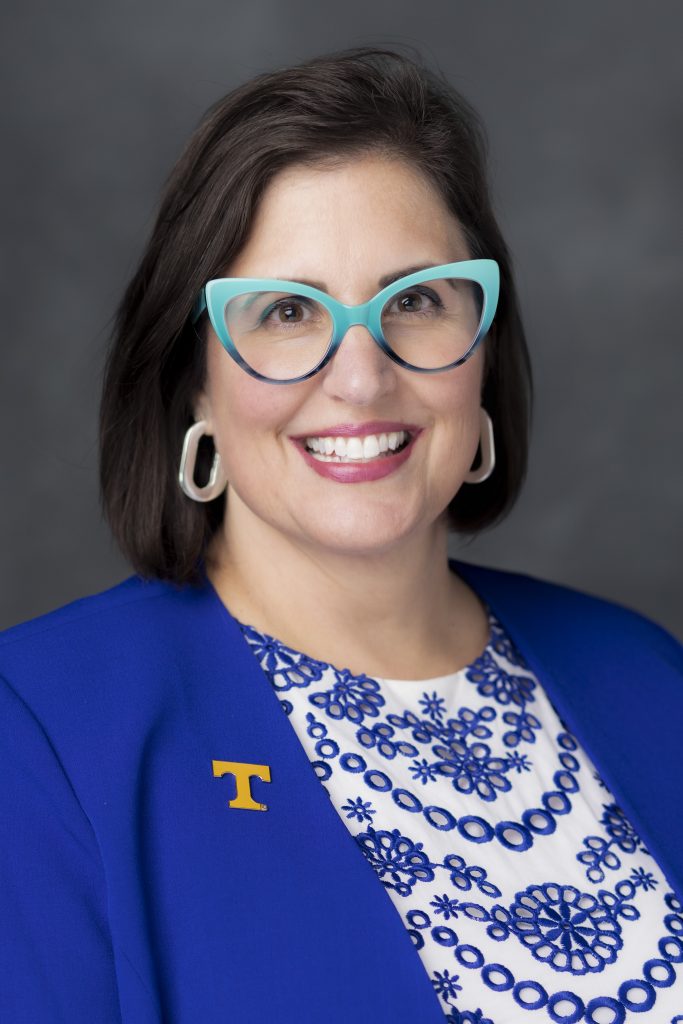Marieke Van Puymbroeck (MSRPT ’01)
Vice Provost & Graduate School Dean, University of Tennessee Knoxville

Marieke Van Puymbroeck, Ph.D., CTRS, FDRT, knows how vital a great mentor can be. As associate dean of the graduate school at Clemson University, she focused on the well-being of graduate and professional students and started the Clemson Graduate Center for Transformational Mentorship to help students succeed. Van Puymbroeck’s experience with mentorship goes back to her time as a graduate student at the University of Florida.
Van Puymbroeck, who earned her bachelor’s degree in therapeutic recreation/recreational therapy at Longwood University, always felt a calling to help others. After spending her early career as a clinician in a psychiatric hospital and rehab facility, she reconnected with her college mentor, Candace “Candy” Ashton-Schaffer, at a conference. Ashton-Schaffer encouraged her to consider attending graduate school, which she had not considered before.
“As a clinician, I always wanted to work with older adults, and I knew I wanted to work in rehab facilities or skilled nursing, improving the quality of life for people with acute or chronic health conditions,” she said. “I loved what I was doing, but I also felt like if I taught people how to be great recreational therapists, the impact would be multiplied.”
After learning about the UF College of Health & Human Performance from Ashton-Schaffer, an HHP faculty member at the time, Van Puymbroeck applied and was accepted into the Department of Recreation, Parks & Tourism, now the Department of Tourism, Hospitality & Event Management, to study therapeutic recreation. While she had a firm understanding of the clinical role of recreational therapists, Van Puymbroeck knew she would need to have a better understanding of her profession through a research lens. Van Puymbroeck, who interned on the UF Health Shands Hospital heart transplant unit, was developing her master’s thesis when a professor sparked inspiration.
“I had a faculty member in HHP who revolutionized my world about research,” she said. “My professor said, ‘a lot of times, we assume that we know what’s going on with people when in fact we have no idea because we haven’t asked them what’s going on,’ and that was such a lightbulb moment for me. I said, ‘I think I have to do a qualitative study for my thesis because nobody really knows what the issues are here.’”
Additionally, she also learned how to think more strategically and theoretically from another professor and mentor, Heather Gibson, Ph.D., a professor in the Department of Tourism, Hospitality & Event Management.
“If people don’t have sound reasoning or ideas behind the work they’re doing, there’s so much that can be missing,” she said. “I learned so much from Heather on how to think better in the work that we do.”
Faculty members like these helped Van Puymbroeck think differently about research, resulting in novel findings based on patients waiting for a heart transplant.
“We [Van Puymbroeck and other college members] were some of the first who published anything related to these patients’ recreation and leisure needs,” she said.
After earning her master’s and doctoral degrees at UF, Van Puymbroeck pursued working in academia and was later recruited to be the program director of recreational therapy at Clemson. Under her leadership, she and her team developed an undergraduate program that became accredited, developed an online master’s curriculum and an online doctoral program, becoming one of the first of its kind in the country in recreational therapy.
She continued to ascend into leadership roles, including associate dean in the graduate school at Clemson University, and now, as vice provost and dean of graduate school at the University of Tennessee Knoxville, she oversees the graduate student experience. Her responsibilities extend from overseeing graduate education to helping ensure students have a positive and impactful experience, including forming meaningful connections across campus, which sets them up for success beyond graduation.
“Good mentorship can reduce mental health concerns in grad students, improve retention, reduce attrition and improve graduation rates,” Van Puymbroeck said.
Having been profoundly impacted by her graduate student years, she encourages current and incoming graduate students to seize available opportunities. “I once never thought about graduate school for myself, and now I’m leading a graduate school,” she said. “Take advantage of graduate opportunities – if there are options, get involved.”
